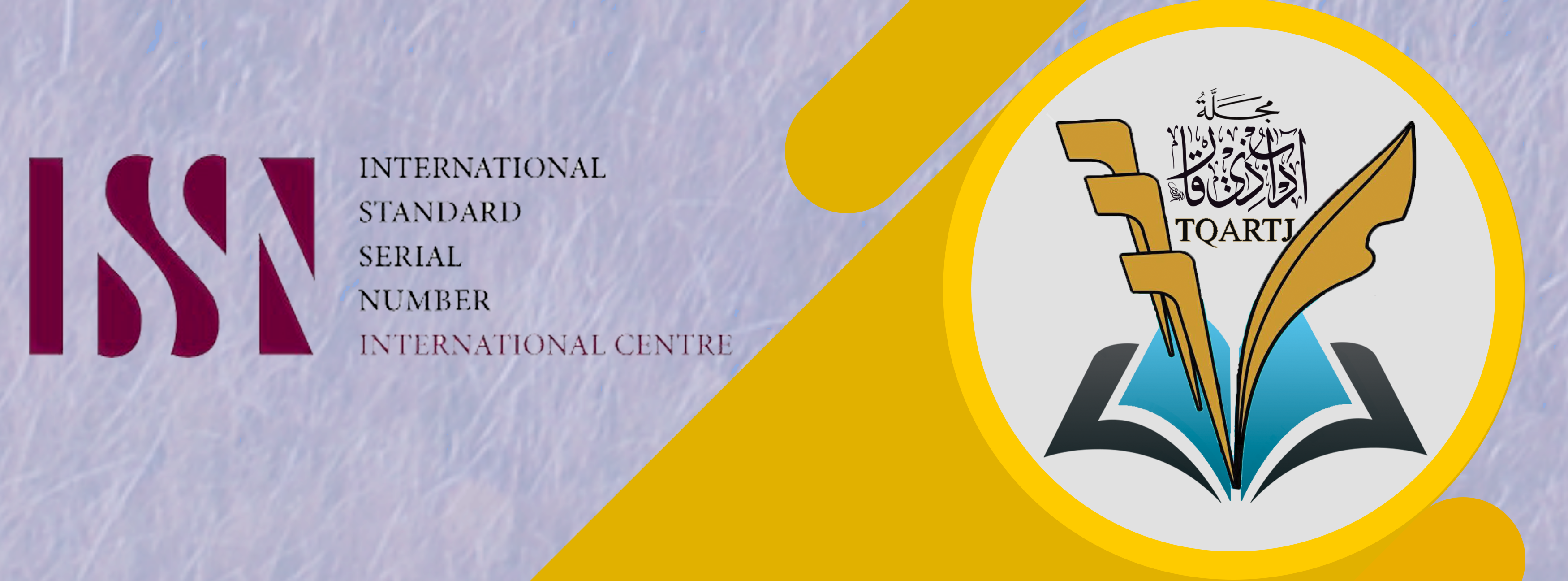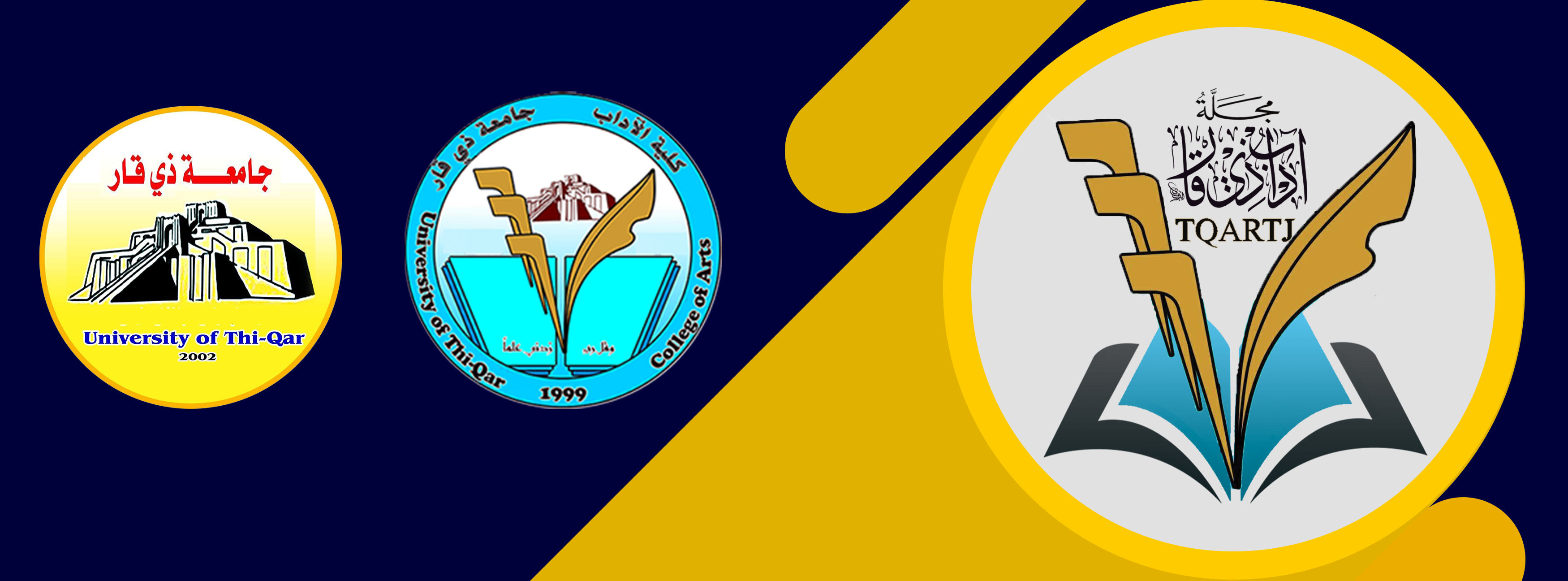جمالية الصورة الاستعارية للإمام الحسين (عليه السلام) في الأدب الأندلسي (عصر الموحدين أنموذجا)
DOI:
https://doi.org/10.32792/tqartj.v1i45.533الكلمات المفتاحية:
الإمام الحسين ، الصور الاستعارية ، الأدب الأندلسي ، عصر الموحدين .الملخص
تُعدّ الصورة الشعرية ركنا أساسيا من أركان العمل الأدبي، وعنصرا بنائيا بالغ الأهمية لدراسة جوهر النص الشعري، وهي الأداة الأبرز التي تمكن الناقد من استكشاف تجربة الشاعر وتكوينه النفسي، ومعيارا لقياس موهبته ، والحكم عليه، وقد حظيت باهتمام النقّاد والدارسين، ونالت حيزاً واسعاً من الجدل والبحث، بما تمتاز به من طبيعة مرنة وترابطات متشابكة، وتعدد التراكيب الوصفية لها وتنوعها.
والاستعارة تعد من أبرز آليات صناعة الصورة الشعرية، والوسيلة الصورية التي يجمع عليها اغلب النقاد تقريبا، بما فيهم النقاد العرب القدامى، الذين احتفلوا بالصورة الشعرية، وربطوها بالألوان البلاغية.
ويحاول بحثنا الموسوم بـ(جمالية الصورة الاستعارية للإمام الحسين عليه السلام في الأدب الأندلسي - عصر الموحدين أنموذجا) ، بناء على المنهج الوصفي- التحليلي، استجلاء ملامح الصورة الاستعارية التي جسدها شعـراء عصر الموحدين للإمام الحسين (عليه السلام) في شعرهم من أمثال ابن الآبار القضاعي، وأبو البحر صفوان المرسي التجيبي، وحازم القرطاجني واحمد بن شكيـل الأندلسي وناهض بن محمد الأندلسي، وأبو العباس الجراوي، وأبو البقاء الرندي ، والمواضع التي نرى فيها شعراء عصر الموحدين معتمدين على الاستعارة في تجسيد صورة الإمام الحسين (عليه السلام)، بوصفها صنعة أدبية تمثل الصورة وتؤدي دورها. وأشارت النتائج إلى أنَّ الأدب الأندلسي لم يكن أمويا خالصا، وإنَّما كان قسماً منه أدبا شيعياً ملتزما، وانطلقت حناجر شعراء عصر الموحدين، تصدح بمدح ورثاء آل البيت والإمام الحسين، وأصبحت القضية الحسينية من أقوى ظواهر التشيع حضوراً في الأندلس، ولوحظ اتكاء اغلب الشعراء على الصور الاستعارية في قصائدهم، وإنَّ اغلب الصور كانت متشابهة من ناحية الدلالة والمفهوم، هدفها البكاء واستدرار الدمع وإحياء عاشوراء.
التنزيلات
المراجع
The Holy Quran.
Firstly – Printed Books:
Ibn Al-Athir, Abu Al-Hassan Ali bin Muhammad (1978), “The Complete History,” Beirut: Dar Al-Kutub Al-Ilmiyah.
Ibn Al-Athir, Abu Al-Hassan Ali bin Muhammad (1983), “The Widespread Example in the Literature of the Writer and the Poet,” edited by: Ahmad Al-Hawfi and Badawi Tabana, 2nd edition, Riyadh: Dar Al-Rifa’i.
Ismail, Ezzedine (1988), “Contemporary Arab Poetry: Its Issues and Artistic and Spiritual Phenomena,” Beirut: Dar Al-Awda.
Ibn Abi Usaibia, Muwaffaq Al-Din Abu Al-Abbas (no date), “The Sources of News in the Classes of Physicians,” edited by: Nizar Rida, Beirut: Dar Maktabat Al-Hayat.
Al-Amin, Hassan (1983), “Introduction to Durar Al-Samt in the News of the Sibt,” Shia Islamic Encyclopedia, Beirut: Dar Al-Ta’aruf.
Al-Jahiz, Abu Uthman Amr bin Bahr bin Mahjub (1967), “The Expression and Elucidation,” edited by: Abd Al-Salam Muhammad Haroun, 3rd edition, Cairo: Maktabat Al-Khanji.
Al-Jahiz, Abu Uthman Amr bin Bahr bin Mahjub (1996), “The Animal,” edited by: Abd Al-Salam Haroun, Beirut: Dar Al-Jeel.
Al-Jarawi, Ahmad bin Abd Al-Salam, (1994), “Diwan of Abu Al-Abbas,” crafted by: Ali Ibrahim Al-Kurdi, Damascus: Dar Saad Al-Din.
Al-Jurjani, Abdul Qahir (1991), “Secrets of Eloquence,” edited by: Mahmoud Muhammad Shaker, Cairo: Dar Al-Madani, Jeddah.
Al-Jurjani, Abdul Qahir (1992), “Signs of Miracles,” edited by: Mahmoud Muhammad Shaker, 3rd edition, Cairo: Dar Al-Madani, Jeddah.
Al-Jurjani, Ali bin Abdul Aziz (2006), “The Mediation between Al-Mutanabbi and His Opponents,” edited and explained by: Muhammad Abu Al-Fadl Ibrahim and Ali Al-Bijawi, Beirut – Sidon: Al-Maktaba Al-Asriya.
Al-Jurjani, Ali bin Muhammad (no date), “The Collection of Definitions,” edited by: Muhammad Siddeq Al-Minshawi, Cairo: Dar Al-Fadila.
Abu Haqqa, Ahmad (1979), “Commitment in Arab Poetry,” Beirut, Dar Al-Ilm Lilmalayin.
Al-Khatib Al-Qazwini, Jalal Al-Din Abu Al-Ma’ali Muhammad bin Abdul Rahman (1989), “The Clarification in the Sciences of Rhetoric,” edited by: Muhammad Abdul Mon’em Khafaji, 3rd edition, Beirut: Dar Al-Jeel.
Ibn Al-Khatib, Lisan Al-Din (2002), “The Coverage in the News of Granada,” edited by: Yusuf Ali Al-Tawil, Lebanon: Dar Al-Kutub Al-Ilmiyah.
Ibn Al-Khatib, Lisan Al-Din (1956), “The Works of the Famous in Those Who Were Pledged Allegiance Before Puberty Among the Kings of Islam,” edited by: Levi (Provençal), Beirut: Dar Al-Shorouk.
Abu Deeb, Kamal (1995), “The Dialectic of Concealment and Revelation,” 4th edition, Beirut: Dar Al-Ilm Lilmalayin.
Al-Ruba’i, Abdul Qahir (1980), “The Artistic Image in the Poetry of Abu Tammam,” Jordan – Irbid: Yarmouk University Publications.
Ibn Abi Zar’, Ali bin Abdullah Al-Fasi (1972), “The Entertaining Companion in the Garden of Qurtas in the News of the Kings of Morocco and the History of the City of Fez,” Rabat: Dar Al-Mansour for Printing and Paper.
Salem, Sayed Abdel Aziz (no date), “The History of Muslims and Their Monuments in Andalusia,” Lebanon: Dar Al-Ma’arif.
Al-Salmi, Abdul Malik bin Habib (2008), “The Book of History,” cared for by: Abdul Ghani Musto, Beirut: Sons of Al-Sharif Al-Ansari Company.
Shawqi, Ahmed (2000), “Diwan of Shawqiyat,” edited by: Ali Abdul Mon’em, Egypt: Dar Al-Qahira.
Al-Abadi, Ahmed Mukhtar (no date), “In the History of Morocco and Andalusia,” Beirut: Dar Al-Nahda Al-Arabiya.
Abbas, Fadl Hassan (2005), “Rhetoric: Its Arts and Varieties,” Jordan: Dar Al-Furqan.
Atiq, Abdul Aziz (1985), “In Arabic Rhetoric: The Science of Expression,” Beirut: Dar Al-Nahda Al-Arabiya.
Ibn Idhari, Abu Al-Abbas Ahmad bin Muhammad (1983), “The Western Statement in the News of Andalusia and the Maghreb,” edited and reviewed by: J.S. Collan and Levi Provençal, 3rd edition, Beirut: Dar Al-Thaqafa.
Al-Adhari, Ahmad bin Omar (1965), “The Embellishment of News and the Variation of Monuments,” by Abdul Aziz Al-Ahwani, Madrid.
Al-Askari, Abu Hilal (1952), “The Book of the Two Crafts: Writing and Poetry,” edited by: Ali Muhammad Al-Bijawi, Muhammad Abu Al-Fadl Ibrahim, Beirut: Dar Ihya Al-Kutub Al-Arabiya.
Asfour, Jaber (1992), “The Artistic Image in the Arab Critical and Rhetorical Heritage,” 3rd edition, Beirut: The Arab Cultural Center.
Qara, Hayat (1998), “Abu Al-Abbas Ahmad bin Shakil Al-Andalusi, the Poet of Sharrish,” Abu Dhabi: The Cultural Complex.
Ibn Qutaybah, Abu Ja’far Abdullah bin Muslim (1990), “The Imamate and Politics,” edited by: Ali Shiri, Beirut: Dar Al-Adwa.
Al-Qurtajani, Hazem (1973), “Poems and Fragments Crafted by Abu Al-Hassan Hazem Al-Qurtajani,” edited by: Al-Khoja Muhammad Al-Habib, Tunisia: Tunisian House for Publishing.
Al-Muraghi, Ahmed Mustafa (no date), “Sciences of Rhetoric (Expression, Meanings, and Beauty),” Beirut: Dar Al-Kutub Al-Ilmiyah.
Maslouh, Saad (2002), “In the Literary Text: Statistical Stylistic Studies,” 3rd edition, Cairo: World of Books.
Al-Maqqari, Ahmad bin Muhammad Al-Tilimsani (1949), “Nafh Al-Tayyib from the Moist Branch of Andalus,” edited by: Muhammad Muhyi Al-Din Abdul Hamid, Egypt: Sa’adah Press.
Maki, Mahmoud Ali (1993), “Shiism in the Maghreb Countries Until the Middle of the Fifth Hijri Century,” Cairo: Dar Al-Nahda Al-Arabiya.
Maki, Mahmoud Ali (2004), “Shiism in Andalusia from the Conquest Until the End of the Umayyad State,” Cairo: Maktabat Al-Thaqafa Al-Diniya.
Ibn Manzur, Abi Al-Fadl Jamal Al-Din Muhammad bin Makram (no date), “Lisan Al-Arab,” Beirut: Dar Sader.
Al-Nuwayri, Shihab Al-Din Ahmad bin Abdul Wahhab (no date), “The Ultimate Ambition in the Arts of Literature,” edited by: Abdul Majid Turhini, Beirut: Dar Al-Kutub Al-Ilmiyah.
Secondly - University Dissertations and Theses:
Balghaith, Abdulrazzaq (2010), “The Poetic Image in the Poetry of the Poet Ezzedine Mahyoubi: A Stylistic Study,” Master’s Thesis, Faculty of Arts, Algeria: University of Bouzareah.
Al-Shiddi, Asma bint Abdulrahman bin Muhammad (2014), “Time in Andalusian Poetry in the Era of the Taifa Kingdoms (422 - 484 AH),” Master’s Thesis, Faculty of Arabic Language, Saudi Arabia: Imam Muhammad bin Saud Islamic University.
Mahwi, Rabeh (2009), “The Poetic Image in the Diwan of Prince Abi Rabia Sulaiman bin Abdullah Al-Muwahhid,” Master’s Thesis, Faculty of Arts, Algeria: University of Mohamed Khider.
Thirdly – Research in Journals and Periodicals:
Al-Zubaidi, Nadhir Haroun (2019), “A Cultural Reading of the Husseini Mourning,” Cultural Symposium, The Cultural House in Al-Aziziya District affiliated with the General Directorate of Cultural Relations in the Iraqi Ministry of Culture, Tourism, and Antiquities. 44. Said, Aqeel Muhammad (2017), “Imam Hussein, peace be upon him, in Andalusian Culture: Ibn Al-Abbar Al-Quda’i as an Example,” Journal of the Islamic University College, Issue 43.
Abbas, Reda Hadi (no date), “The Revolution of Imam Hussein, peace be upon him, in Andalusian Heritage,” Journal of Ahl Al-Bayt, Issue 7.
Al-Ghazali, Abdul Amir Anad (2004), “Hussein, peace be upon him, in Andalusian Poetry,” Najaf Studies Journal, Third Issue.
Al-Haras, Abdul Salam (1979), “The Tragedy of Hussein in Andalusian Literature,” Al-Manahil Magazine, Rabat, Issue 14.
التنزيلات
منشور
إصدار
القسم
الفئات
الرخصة
الحقوق الفكرية (c) 2024 Moshreq Shaban Madhul, Dr. Somayeh Hassanalian

هذا العمل مرخص بموجب Creative Commons Attribution 4.0 International License.
تطبق المجلة رخصة المشاع الابداعي (a Creative Commons Attribution 4.0 International) . تسمح هذه الرخصة للمؤلفين بالاحتفاظ بحقوق النشر لأوراقهم. ولكن هذه الرخصة تسمح لأي مستخدم بتحميل، طباعة، استخراج، إعادة استخدام، أرشفة، وتوزيع المقال، طالما يتم إعطاء الائتمان المناسب للمؤلفين ومصدر العمل. تضمن الرخصة أن يكون المقال متاحًا على نطاق واسع قدر الإمكان وتضمين المقال في أي أرشيف علمي.


















